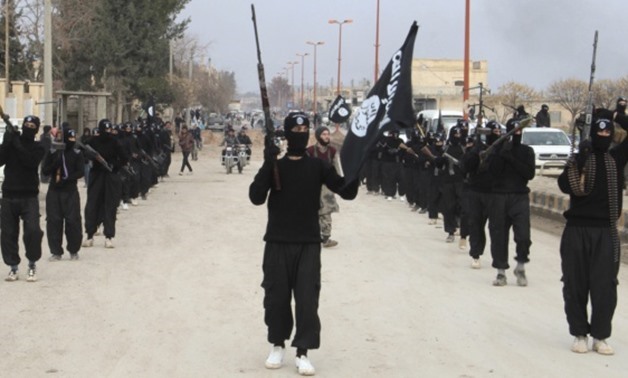
Islamic State militants parade in Tel Abyad, near Syria's border with Turkey. (Yaser Al-Khodor/Reuters)
CAIRO – 16 May 2018: Elements of the “Helwan Brigades” case were re-designated as terrorists by the court on Tuesday over charges including attempts to topple the regime and leading terrorist attacks.
The Court of Cassation upheld a verdict designating 135 elements of the terrorist Muslim Brotherhood group in the Helwan Brigades case on the terror list.
The criminal court had issued a ruling listing 215 elements on the terror list upon a memo presented by the prosecution in 2017, but 135 elements challenged the ruling in the Court of Cassation.
Late Public Prosecutor Hisham Barakat had ordered the detention of the suspects pending investigation in February 2015.
Charges
Barakat referred the convicts to the criminal court, as the Supreme State Security charged them with drawing up a scheme inside the jail to topple the regime and assigning elements outside the prison to carry out terrorist operations.
The defendants face charges of aiding and abetting escaped prisoners, resisting authority and public property damage. These crimes are worthy of the death penalty. They also face charges of forming an illegal group that aims to obstruct state institutions from doing their duties, violating citizens’ constitutional rights and harming national unity.
The defendants are also charged with forming an armed group to carry out operations against policemen and sabotage public property, as well as power pylons and transformers.
How they started
In August 2014, some of the members belonging to a self-proclaimed group called the “Helwan Brigades” released a video on social media networks threatening security forces. Twelve masked men were taped saying they were fed up with the Muslim Brotherhood’s peacefulness and vowed to attack all police facilities in Cairo.
After being arrested, 51 suspects during the investigation admitted joining the armed group and possessing fire arms, ammunition and explosives.
Escape attempts
In August 2017, a prosecution team went to Tora Prison for investigation after seven prisoners of the Helwan Brigades case tried to escape.
The prisoners caused chaos on the Autostrad in Saqr Quraish, a suburb of Cairo, while returning from court. One of prisoners stole a policeman’s revolver after the policeman was shot in his arm while trying to control the chaos.
The security forces managed to arrest five of the seven prisoners, according to the investigation that confirmed that the prisoners could escape without the help of any external elements.
Terror list
As part of Egypt’s efforts to fight terrorism, President Abdel Fatah al-Sisi issued a new law in 2015 that gives a broad definition of terrorist entities and the sentences against them.
The law defines terrorist entities as a group or individuals that "through any means inside or outside the country, seek to call for the disabling of laws, or prevent state institutions or public authorities from functioning, or seek to attack the personal liberty of citizens, or other freedoms and rights granted to citizens by the law and constitution, or to harm national unity or social peace."
It also includes those who would commit attacks either inside or outside Egypt.
According to the law on terrorist entities (law No. 8/2015), the general prosecution shall create a proscribed terrorist list referred to by the Egyptian court, which has the final say as to individuals’/groups’ designation as terrorists.
Egypt has designated the Muslim Brotherhood, the Sinai-based militant group Ansar Beit Al-Maqdis, the Islamic State group, Palestinian Hamas's military wing and Al-Qassam Brigades as terrorist groups due to their violent acts, their attempts to incite chaos throughout the country and destabilize Egypt, and for claiming responsibility for a number of deadly attacks on security forces.
Most of the group’s members and leaders are either in prisons or have fled the country.
Additional reporting by Marina Gamil, Hanan Fayed and Walaa Ali


Comments
Leave a Comment